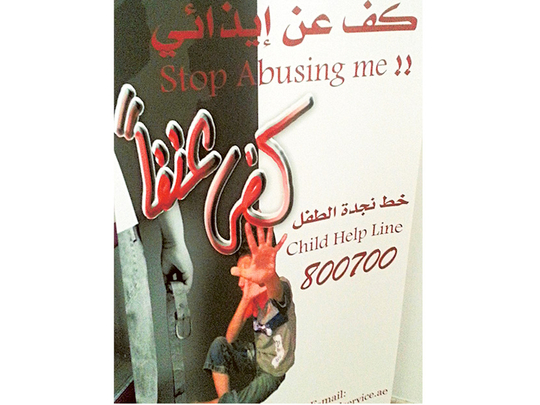
Sharjah: The first emirate in the UAE to create a programme to address and treat the psychological impact of abuse on children, Sharjah’s Eshraqa initiative, is helping many children with their problems.
The programme was launched this year and a number of cases have already been treated. Run by specialists, Eshraqa involves a number of steps starting with individual sessions, group sessions, play and song, which explain to the child how to protect him/her from any type of abuse. The song was recorded and filmed in Arabic and it will also be recorded and filmed in English.
The song will be loaded on YouTube and on the department’s website shortly.
Sharjah’s Child Protection Department, one of the first of its kind in the region when it was formed in 2007, has received calls for assistance from all emirates in the UAE, Ahmad Ebrahim Al Tartoor, director of Protection of Children’s Rights Administration at Sharjah Social Services Department, told Gulf News.
Sharjah’s round-the-clock 800 700 toll-free helpline for child abuse, also set up in 2007, registered 400 cases in 2014, compared with 309 in 2013. Fifteen involved sexual abuse, 148 physical abuse, 176 neglect and 61 were classified as emotional abuse or “verbal abuse”.
Meanwhile, during the first quarter of 2015, the hotline registered 74 cases. Six involved sexual abuse, 29 physical abuse, 25 neglect and 14 were classified as emotional abuse or “verbal abuse”. A team of social workers, psychologists and lawyers responds to the calls and refers them to police, if needed. Abuse cases are referred to the police if the children are believed to be in danger.
A steady increase in cases since the hotline opened is evidence of the need to create greater awareness, Al Tartoor explained.
Sometimes, the Sharjah 24-hour hotline receives calls from children themselves to report ill-treatment. In one case, a child called the hotline to complain that his parents work two shifts and he does not get to see them the whole day. He said that he spends all his time with the housemaid, who takes care of him.
The department phoned the parents and met with them. Guidance was provided to the parents on how to deal with their child.
Other times, cases termed ‘dangerous’ come to light. Al Tartoor said a case which involves severe physical abuse or ‘hard beating’ is termed as dangerous for the child.
If the child is not believed to be in danger, the department provides social services such as family therapy, connects needy families to food aid, provides school fee assistance or health services. The department places great importance on maintaining family ties.
The helpline is a member of the global network, Child Helpline International, and is staffed by professional crisis counsellors who, through interpreters, can provide assistance in two languages, Arabic and English. The helpline offers crisis intervention, information, literature, and referrals to hundreds of emergency, social service, and support resources. All calls are confidential.
The helpline is also a valuable resource for those who are mandated by law to report suspected abuse, such as school personnel, medical and mental health professionals.
The Child Protection Department also receives complaints in Arabic and English on their website and responds to them immediately.
Parental document
The Child Protection Department witnessed the signing of a memorandum on Parental Responsibility in March this year, when His Highness Dr Shaikh Sultan Bin Mohammad Al Qasimi, Supreme Council Member and Ruler of Sharjah, issued an Emiri Decree No 41 of 2015 on the adoption of a convention on parental responsibility towards their children in the event of divorce or separation.
In one case, a 26-year-old Arab man, married with one daughter, approached the department asking for the rights of his wife and daughter in case he divorced his wife.
The department gave him a copy of the Parental Responsibility memorandum which he needed to sign and implement its conditions if he wanted to proceed with the divorce.
The man said that he could not implement the conditions listed in the memorandum and he abandoned the idea of divorcing his wife and opted for reconciliation.








